March 2026 Competitions

I have updated my list of competitions…

I have updated my list of competitions…
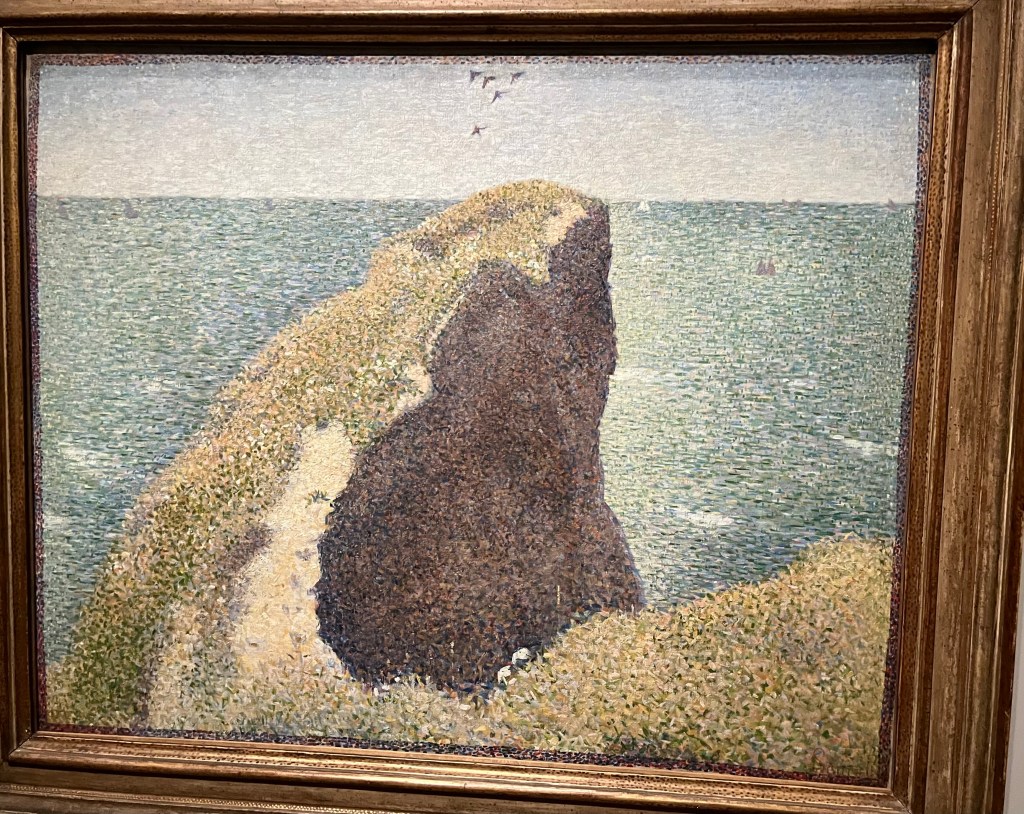
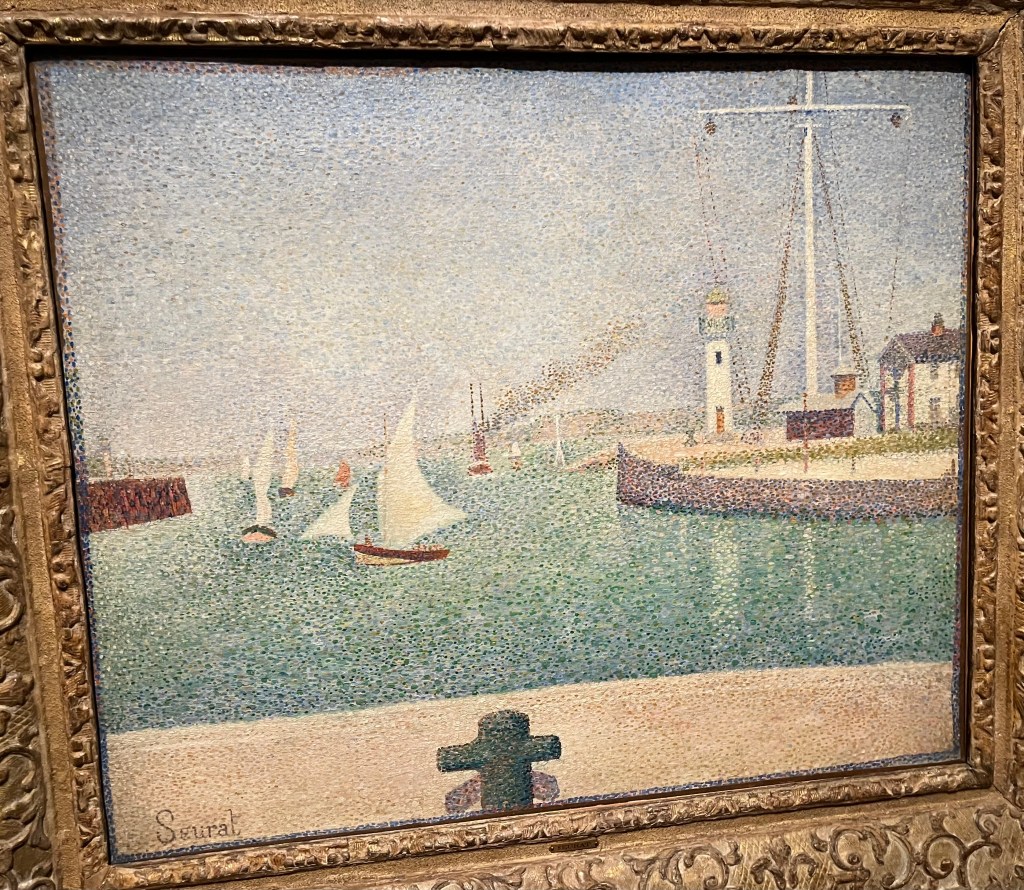

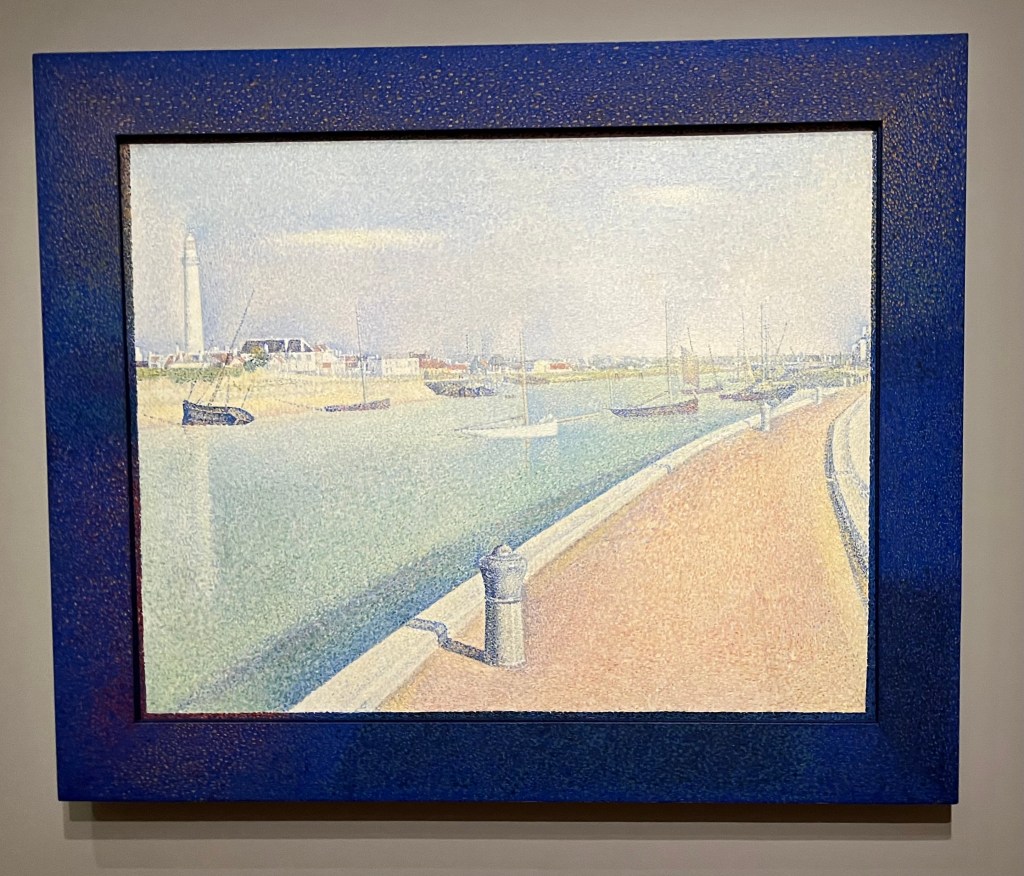
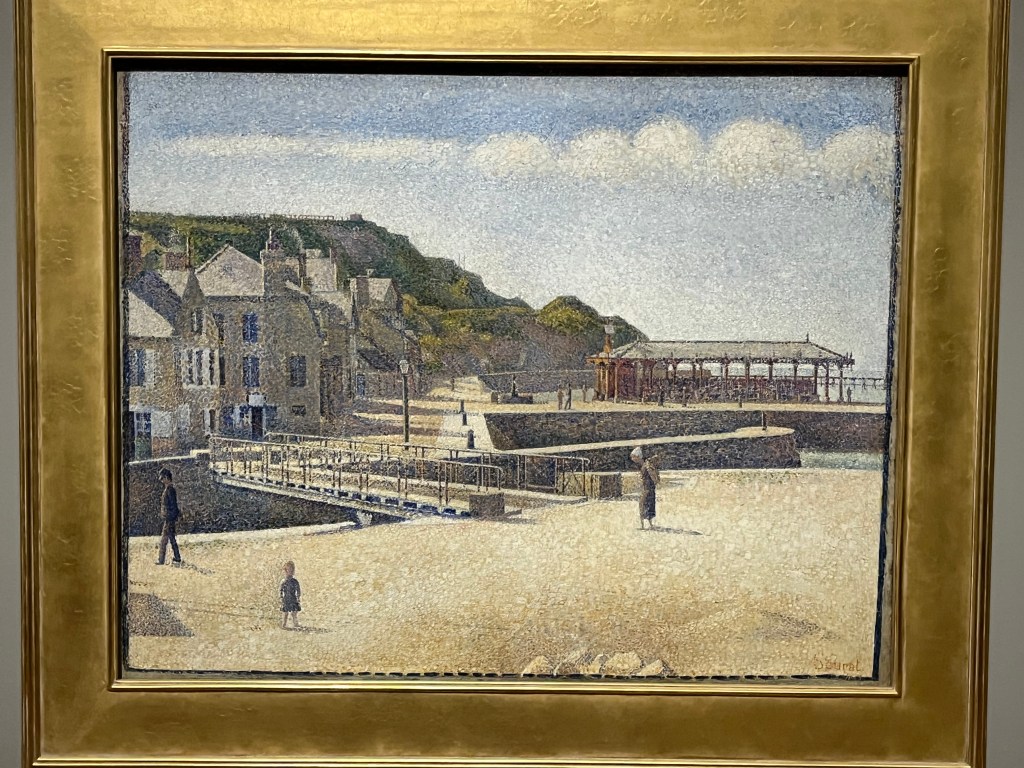
We went to the Seurat exhibition at the Courtauld. It is a small, focused show, featuring a series of paintings he did of ports and landscapes along the Channel coast, including some preparatory sketches. This gives a good opportunity to make comparisons and see the development of his technique.
Seurat of course was the leading exponent of pointillism, in which the picture is built up from hundreds of dots of unmixed colour. One aspect of the method that I hadn’t appreciated is that dots of the opposite colour are always included, so for example in a blue area there will be some dots of orange. This is meant to give a special vibrancy to the colour. Often it really does, lending a unique luminosity to the paintings, but I thought in other cases it was less effective. Seen from a distance those less successful works look very much like straight, accurately realistic pictures.
We’ve seen Seurat’s pictures before, and in fact the Courtauld itself has several on display that are not part of the current show. But the consistency of subject and the interesting sketches here make it an illuminating exhibition.
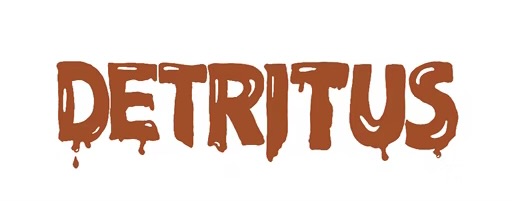
My story Cities of the Antediluvian World has been longlisted in the Pudding Press Detritus competition!

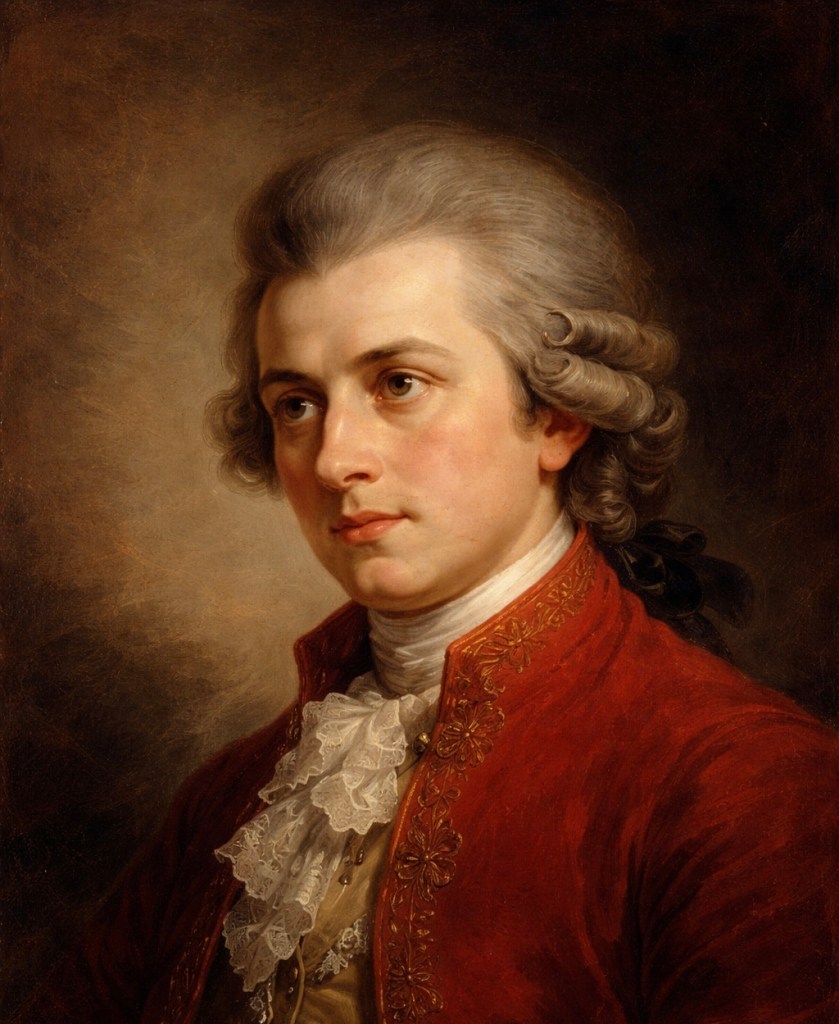
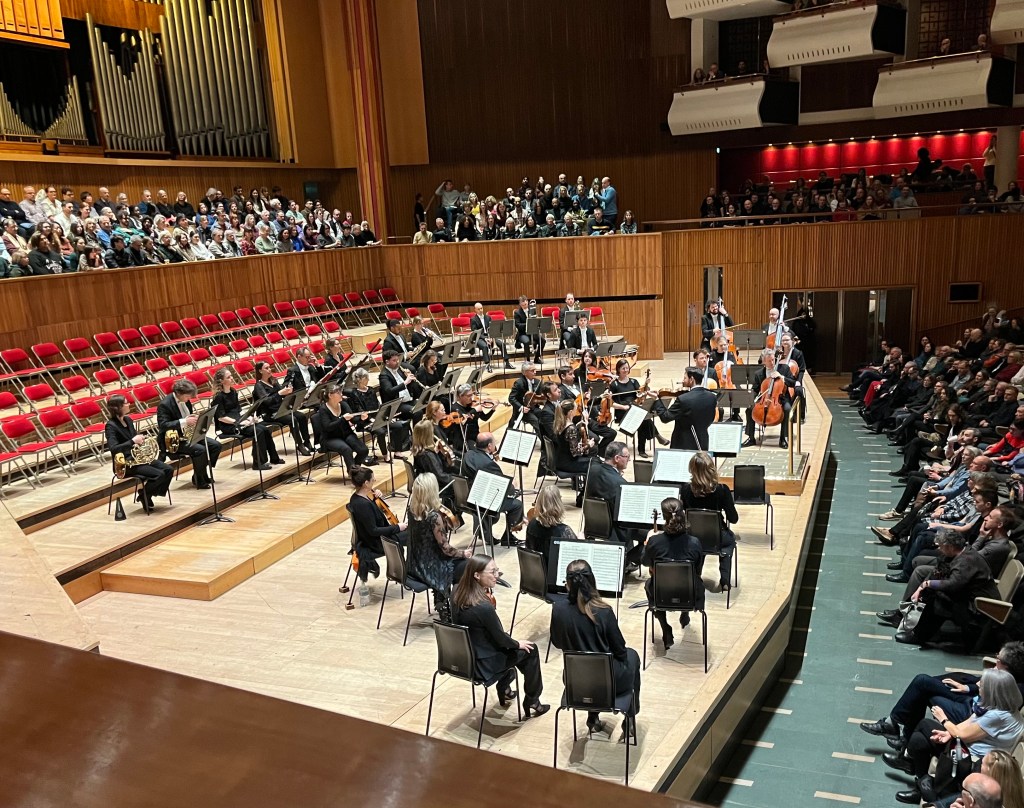
We went to an enjoyable concert consisting of the Overture to the Magic Flute, Piano Concerto no. 21, and the Requiem. Music this popular is often used as a lure to get audiences to listen to something more obscure, but this was pure pleasure.
I remember being shocked when I first discovered that the usual version of the Requiem is a completion of a work Mozart never finished himself. Whether or not he really came to think of it as music for his own funeral, it’s impossible not to be reminded of his early death, which certainly deprived us of some of the greatest classical music never written. Imagine the results of an extended rivalry between Mozart and Beethoven, each needling the other into constantly raising their game, like some Romantic era Lennon and McCartney…
I have now collected the competition details from previous months and put them all together on a new page, which I will update rather than making separate posts. February’s info is already there. You’ll see there’s also a direct link from the front page to the new one. I think this will make the list a little easier to find and consult. The idea is also that in due course there will be a full rolling twelve months on the page, which should make it easier to look at old details to get an idea of what’s probably coming up beyond next month.
I hope this is helpful. Feedback is welcome, (but don’t write to say you’d like all the competitions to be free, for I am powerless in that respect).
Here is another monthly round-up, covering competitions with deadlines in January.
As always, these are contests I may enter myself, so generally no poetry or flash and no competition that isn’t open to an elderly bloke in the UK. Prizes and entry fees vary a lot, so check the benefits to see whether they appeal to you. There is no point in entering a competition if you don’t even want the prize! In some cases the entry fee amounts to a large slice of the prize, though there may be other benefits such as publication, trophies, free books or courses, etc.
Merry Christmas!
| Contest | Word Count | Fee | Prize | Deadline | Details |
| Exeter Novel Prize | 10k + synopsis | £20.00 | £1,000.00 | 01/01/2026 | |
| Disquiet Literary Prize | 25 pages | $15 | Lisbon Program or $1,000 | 05/01/2026 | First prize is a week-long lit program in Lisbon, but you can opt for cash |
| Storybottle | 10,000 | $15 | $1,000 | 15/01/2026 | |
| Cai Emmons | 25,000 word min | $25 | $5,000 | 15/01/2026 | |
| Georgia Review | Less than 9,000 | $25 | $1,500 | 15/01/2026 | Winners of story and essay sections compete for the top prize. |
| The Page is Printed | 1 A4 page | £5 | £100 voucher | 19/01/2026 | |
| LISP | 3,000 | £14.50 | £100 | 26/01/2026 | You can enter later but it costs more |
| Thomas Wolfe Fiction Prize | 3,000 | $25 | $1,000 | 30/01/2026 | |
| Parracombe | 2,026 | £5 | £150 | 31/01/2026 | |
| The Ghost Story flash | 1,000 | $15 | $1,000 | 31/01/2026 | |
| Bristol Short Story Prize | 4,000 | £14.00 | £1,000 | 31/01/2026 | |
| Askew’s Word on the Lake | 2000 | $15(Ca) | $200(Ca) | 31/01/2026 |
We went to see the new production of Woman In Mind, the Alan Ayckbourn classic, staring Sheridan Smith as Susan and with Romesh Ranganathan as Bill Windsor. It’s a great show and I recommend it: funnily enough my only reservations are about the play itself. There are some spoilers in what follows.
The story is in essence about a woman losing her mind. In the early stages her delusional and at first ideal life contrasts with the depressing reality, as she switches between the two. I would have liked a neat resolution to all this, but we don’t get one: instead the delusions get stronger, less controllable and less pleasant and eventually swallow her up.
I said one side of the story is the depressing reality of her life, but in fact our faith in the reality of even the ‘real’ parts is gradually undermined (or at least, mine was). Bill Windsor seems to move across gradually from sensible reality to florid delusion. Muriel the sister-in-law seems like a caricature, too completely awful to be a real person. The behaviour of Susan’s son is not depressing in normal ways but bizarre, and seems to revolve around her, even if in a most negative way. So perhaps in the end we are to realise that the entire play is the record of a set of growing delusions that reflect reality only in a distorted way. That can still be interesting, but I think a little less than a play that does engage with real life effectively.